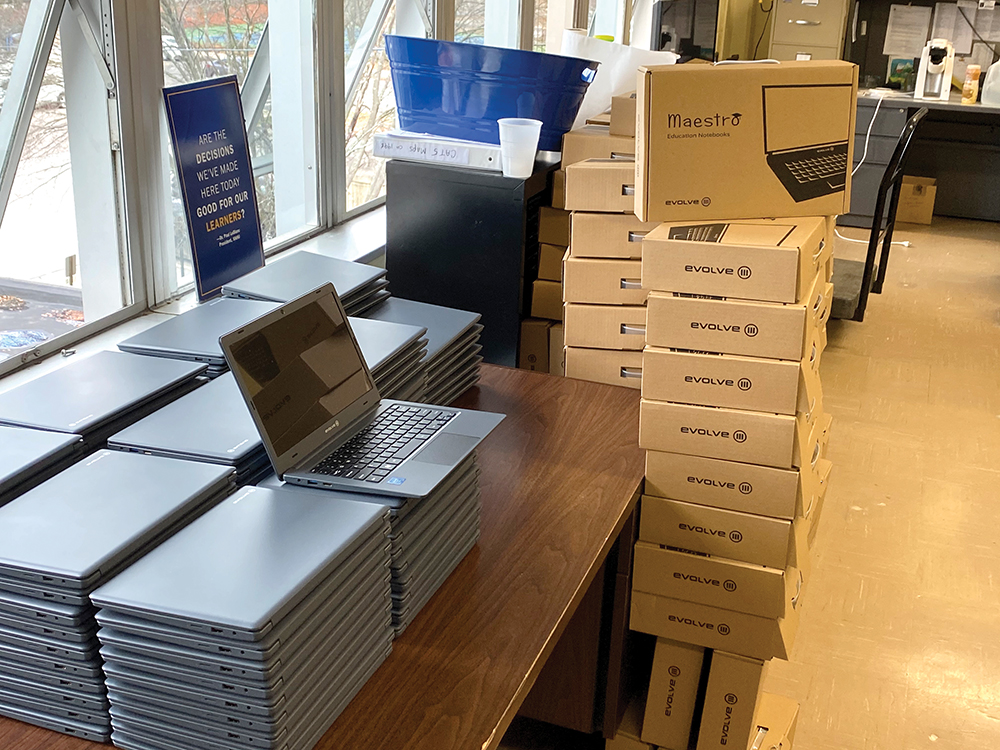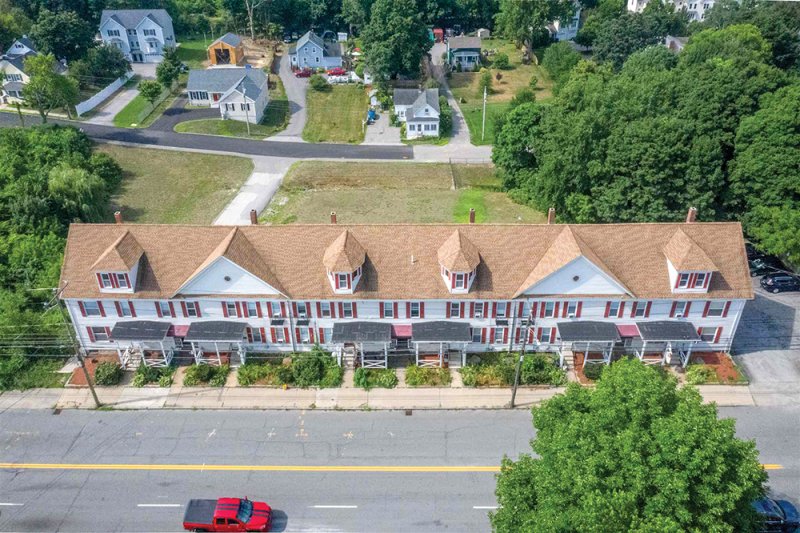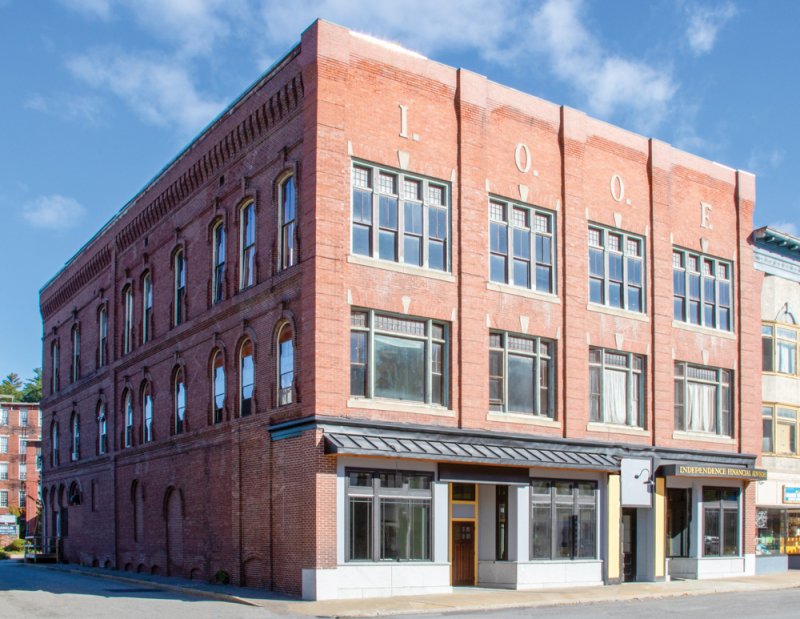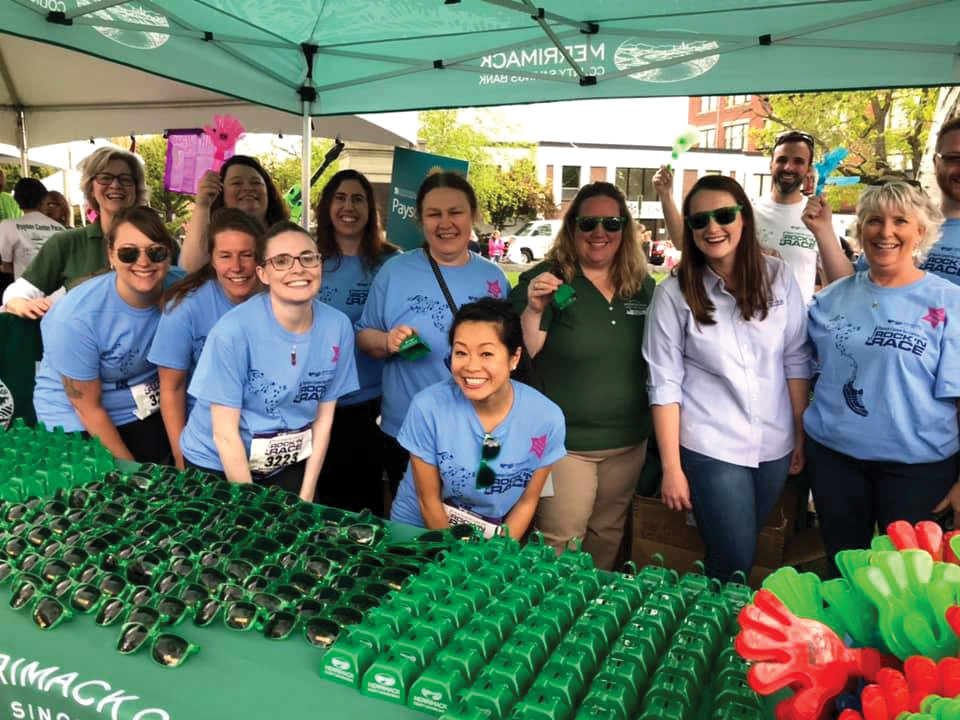 Banks have been the cornerstone of the pandemic recovery. The importance of strong banking relationships crystallized when the pandemic hit last spring, and businesses raced to be among the first to secure government loans. As some businesses continue fight to survive, banks are not only helping them secure funding in the second relief package rolled out in late December, which included $300 billion in aid for small businesses. And banks have continued to invest and donate millions to communities and nonprofits that find themselves threatened.
Banks have been the cornerstone of the pandemic recovery. The importance of strong banking relationships crystallized when the pandemic hit last spring, and businesses raced to be among the first to secure government loans. As some businesses continue fight to survive, banks are not only helping them secure funding in the second relief package rolled out in late December, which included $300 billion in aid for small businesses. And banks have continued to invest and donate millions to communities and nonprofits that find themselves threatened.
In a “typical” year, banks donate more than $20 million in NH annually and provide more than 100,000 volunteer hours, according to the NH Bankers Association.
Securing Critical Loans and Forgiveness
Banks worked overtime during the rollout of the first federal COVID relief package, helping NH small businesses, nonprofits and faith-based organizations secure nearly 25,000 Paycheck Protection Program (PPP) loans totaling more than $2.5 billion. Of those PPP loan dollars, 27% went to people in low- and moderate-income communities.
Gary Barr, TD Bank market president for NH, says the mad rush to help businesses qualify for PPP loans in the spring led to 12-hour days, 40 days straight and even working Easter Sunday for many. Even as they help businesses secure funds from the second relief package, banks continue to help customers to have their loans from the first package forgiven.
“TD led New Hampshire in terms of funds given back to customers,” says Barr. “We saved a boatload of jobs and put $3.4 million into the New Hampshire economy. Our teams worked tirelessly and are still working tirelessly getting those loans forgiven.”
The PPP loans are processed through individual banks and administered by the Small Business Administration. “Most applications for forgiveness will qualify, and it’s extremely important [for] particular industries like hospitality, which is expecting a long, tough winter,” Barr says.
Lending stabilizes businesses in a community, says Chuck Withee, president and chief lending officer at BankProv in Portsmouth. “During this COVID crisis, it is such an unstable environment, we must keep a steady hand on the wheel and make sure we are taking care of the small-to-medium enterprises that employ more than 85% of our New Hampshire workforce,” he says.
However, lending is just one tool banks use to invest in their communities. Banks also provide grants through charitable foundations as well as direct support to local charities and purchase tax credits to fund community development. Nancy Huntington Stager, president and CEO of Eastern Bank Charitable Foundation, the charitable arm of Eastern Bank, a Massachusetts-based bank with locations in NH, says after setting up a Massachusetts COVID-19 Relief Fund for the governor, it created an online platform for the Clipper Fund at the request of the city of Portsmouth.
The Clipper Fund raised $57,000 and provided grants to 19 small businesses, and distributed 220 reopening bags to businesses, which included PPE, masks and no-touch thermometers.
The community investments and philanthropy of banks are also guided by the Community Reinvestment Act (CRA). CRA is a 1977 law intended to encourage banks to help meet the credit needs of their communities including low- and moderate-income neighborhoods. All the banks operating in NH are rated as satisfactory or outstanding in meeting those CRA requirements.
Education
Dianne Mercier, NH president of People’s United Bank, doesn’t view CRA as an obligation but rather as an opportunity. “I love the CRA. I know a lot of people see it as a regulatory burden, but I see the positive impact that this makes,” she says.
One of the most impactful efforts, says Mercier, is the “Leader in Me” program in Manchester, to which the bank contributed $25,000. Run by Granite United Way and based on Stephen Covey’s book, “The 7 Habits of Highly Effective People,” the program integrates leadership development into Manchester classrooms where students as young as 5 years old learn how to track their own attendance and academic performance, and work on projects to address school and community needs.
Bangor Savings Bank President and CEO Bob Montgomery-Rice says, as a mutual bank in Maine, they’ve been ranked as an “outstanding” CRA lender for the past 15 years. “Only 7% of banks get that rating of outstanding. So, the challenge in coming to New Hampshire is how to maintain that rating here.”
He says Bangor is participating in Project Lemonade, an initiative in the Manchester schools that provides students with laptop computers and home broadband, which is more important than ever during remote schooling.

Laptops donated to Manchester schools by Bangor Savings Bank, through its Project Lemonade initiative. Courtesy photo.
“We provided seed capital of $25,000 to help get technical assistance and expertise to get them off the ground,” says Montgomery-Rice. “This is really about inclusion, providing laptops and broadband to more than 1,000 lower- to middle-income students. When you think about social justice and racial equity, the pandemic is going to put people in those groups even farther behind.”
Millyard Bank in Nashua, which launched just a couple months prior to the pandemic hitting NH, was developing a financial education program with the local high school about starting a business from scratch, but the pandemic put the effort on hold, says G. Frank Teas, president and CEO of Millyard Bank.
In the meantime, the bank reached out to partner with World Academy on an effort to recognize the heroes of the pandemic. “We funded supplies for 13 classrooms, for students as young as 4, to create scarecrows that were displayed on the bank lawn,” he says. “The scarecrows represented community heroes like firefighters, doctors, those who went above and beyond in the pandemic.”
Financial literacy is a staple for most financial institutions as it makes students better customers in the long run. Ron Covey, president and CEO of St. Mary’s Bank in Manchester, says the credit union expands its financial literacy efforts annually. But with in-person seminars on hold, a partnership with the Manchester City Library has allowed for some learning to continue. “We developed a four-part series on budgeting, personal security, credit scores and investing, offered virtually and at the library,” he says “People don’t realize how a credit score impacts things, even what you pay for car insurance. They also fail to realize the ways they can improve it themselves.”
Affordable Housing
The Federal Low-Income Housing Tax Credit program provides a strong incentive for banks to invest in much-needed affordable housing.
BankProv partnered with the Portsmouth Housing Authority (PHA) on a new 64-unit workforce housing development to provide a consolidated package of construction and permanent financing, both debt and equity, and sponsored the developer’s application for capital subsidies through the Federal Home Loan Bank of Boston.
Additionally, BankProv purchased a total of $8 million in lower income housing tax credits that they will receive over 10 years, which was the essential ingredient to achieving financial feasibility for this community investment.
Piscataqua Savings Bank in Portsmouth purchased some of the $80,000 in state tax credits for the same project. President and CEO Rick Wallis says people don’t always appreciate the effect the lack of workforce housing has on businesses, including Piscataqua, which employs 40. “A lot of us live outside Portsmouth. Something had to be done.”
Kathy Underwood, president and CEO at Ledyard National Bank in Hanover, says housing has become an issue throughout NH as housing has become almost unaffordable for many. People moving in from other states since the pandemic are increasing demand for an already short supply of affordable homes.
“It really does need to rise to the top of our thinking and our actions,” she says. “If companies are to succeed, their employees need to be able to live in the community they work in. Unfortunately, the current market is not supporting it.” Ledyard is supporting Vital Communities, an advocacy group that promotes economic development and affordable housing in the Upper Valley.
In 2019 and 2020, Citizens Bank in Manchester invested $42.7 million in 10 low-to-moderate-income housing developments in NH, which supported construction or preservation of 407 units of housing. Joe Carelli, state president of Citizens Bank in NH and Vermont, says Citizens is actively seeking investment opportunities in NH to help mostly nonprofit developers create housing for people with low-to-moderate incomes.
“When business owners tell us that one of the challenges of hiring people into the state is finding affordable housing, that really hits home for us,” says Carelli.
St. Mary’s Bank helped finance the acquisition and renovation of a 22-unit rental complex where one-third of the units are reserved for low-to-moderate-income families.

St. Mary’s Bank helped finance the renovation of Amherst Place, an affordable housing project in Nashua. Courtesy photo.
“We have many different affordable housing programs; some are partnerships, some proprietary. We offer special rates, discounts and down-payment options,” says Covey.
“We are [a top] lender in the NeighborWorks Southern NH program,” he adds, referencing the nonprofit that helps people break the cycle of poverty through either home ownership or providing affordable rental housing.
Others efforts are focused on diversifying housing in a community. Franklin Saving Bank (FSB), although headquartered in a city with one of the highest unemployment rates in NH with more in common with the mill towns of the North Country than its neighbors in the Lakes Region, ranks 7th in market share among banks headquartered in NH, something President and CEO Ron Magoon credits to being around for more than 150 years and being involved in the community.
The bank is now a central part of a redevelopment effort and through its IFA (subsidiary investment advisory firm) acquired three buildings downtown. One is already undergoing significant renovation to bring eight luxury housing units to Franklin.
 Franklin Savings Bank helped the renovation at 402 Central St. Courtesy photo.
Franklin Savings Bank helped the renovation at 402 Central St. Courtesy photo.
“It’s an incredibly important project for the city, which for so long has been dominated by Section 8. There are a lot of units available, but we believe, with everything that’s happening, we have to diversify. The IFA will be the pilot to prove that creating high-end housing in Franklin can work as well.”
Magoon credits Todd Workman, who created PermaCityLife and acquired real estate, for facilitating actual change in the downtown. A whitewater park at the center of the effort is a game changer for Franklin, he says. “We want this city to be wildly successful,” Magoon says. “But we do recognize, if not us who? We are the only bank that is headquartered here and has a real presence in this area. A lot does fall on our shoulders, but quite frankly, I think it is appropriate.”
Tax Credits
Many banks support projects through the NH Community Development Finance Authority’s (CDFA) tax credit program, which supports housing, job growth, microenterprises, affordable child care, energy efficiency and improving public facilities. Businesses, including banks, can purchase tax credits by donating to a selected nonprofit. The credit offsets a portion of a business’s state taxes: the business and enterprise tax (BET) and business profits tax (BPT). The CDFA awards approximately $5 million in tax credits annually in a competitive grant round.
Rick Wyman, president of Meredith Village Savings Bank, is on the board of the CDFA, which vets the applications and distributes the credits across the state to support a variety of projects. “It’s not easy because there is a lot of need,” says Wyman. “But the nonprofits have the harder job as they then must ‘sell’ the credits.” One example is the Black Heritage Trail NH in Portsmouth, which in November completed the sale of $450,000 in tax credits it had been awarded. The funds raised supported the purchase of an historic building to serve as its headquarters. Cambridge Trust, Meredith Village Savings Bank, Newburyport Five Cents Savings and Piscataqua Savings Bank were among the businesses that purchased credits for that project.
Nonprofits
The pandemic has created increased need for the services provided by nonprofits, but nonprofits have been facing severe revenue shortages that endanger those services. Banks have been stepping up to increase their support.
“When COVID-19 hit, [Piscataqua Savings Bank] shifted a lot of our dollars that we do throughout the year into the spring to give immediate support to organizations, including shelters and food pantries,” says Wallis.
The NH Nonprofit Response Fund, established by several banks and businesses to provide up to $100,000 of working capital to organizations affected by the pandemic, is supported by NH Mutual Bancorp (NHMB) and sister banks Meredith Village Savings Bank, Merrimack County Savings Bank, Savings Bank of Walpole; as well as Citizens Bank, Eastern Bank and Piscataqua Savings Bank, among others.
“This was our way of saying maybe we could set an example and create a bigger impact by joining a pool,” says Wyman, who helped to spearhead the fund.
Linda Lorden, president of Merrimack County Savings Bank in Concord, says Rock ’N Race for the Payson Center for Cancer Care at Concord Hospital is a cause that touches everyone in the community, and as such, employees volunteer, and the bank is the presenting sponsor. While the pandemic forced the event to go virtual, the bank did not decrease its support. “This challenge changes events but not our support. The need is no less critical because of the pandemic, and it is often greater,” she says. “Many organizations are near and dear to our employees. A team volunteers every month at the Friendly Kitchen, and another works at Granite State Independent Living Foundation.”
 Merrimack County Savings Bank has sponsored the Rock N’ Race for the Payson Center for Cancer Care for over 10 years. Photo from 2019. Courtesy photo.
Merrimack County Savings Bank has sponsored the Rock N’ Race for the Payson Center for Cancer Care for over 10 years. Photo from 2019. Courtesy photo.
While Savings Bank of Walpole already had a long history of giving back to the community when Mark Bodin became president in 2018, he created the position of community engagement officer to work with local nonprofits and help identify needs. “Engaging with community is one of the most important things we do. It’s not just donating money; it’s working with local nonprofits to bring them together and being a matchmaker between staff and organizations.” Bodin says during the pandemic, Savings Bank of Walpole decided to increase its efforts.
Paul Provost, president of NHTrust, says when COVID-19 prevented larger volunteer efforts from taking place, such as United Way Day of Caring, NHMB actively participated in Feed the 603. “The company is donating out of our corporate funds. Our leadership announced matching funds, and all of our employees have now contributed,” he says.
Bar Harbor Bank and Trust, which operates in Maine, NH and Vermont, makes sure the bank gives of its time as well as its money. “We provide time off to work at a not-for-profit,” says President and CEO Curtis Simard. “It’s great to write a check, but time can sometimes be a harder commodity to come by. Our people come back to work more fulfilled and feel good about being a part of this company.”
Simard says he too saw the value in having a dedicated staff member with insight into nonprofits and recruited someone with a foundation background to evaluate requests.
Increasing Diversity and Inclusion
As part of their CRA efforts, banks are also developing strategies to support increased diversity and inclusion across all the services they offer and within their workforce.
Bank of America has several inclusion initiatives addressing the resilience and growth of businesses owned by people of color that contribute to the vitality and health of the Manchester community, says Ken Sheldon, NH market president for Bank of America.
“Current initiatives under way include a potential investment in the New Hampshire Community Loan Fund to specifically invest in minority-owned
businesses,” Sheldon says. “We also recently provided a $20,000 economic resiliency grant to the Organization for Refugee and Immigrant Success,” he says.
In 2019, Bank of America partnered with UNH Manchester to sponsor the Excell-In-STEM program which helps Manchester area middle and high school English learners build their skills in English as well as science, technology, engineering and math.
Enterprise Bank is committed to equality and inclusivity, says Alison Burns, community relations and customer experience officer, SVP. In addition to purchasing tax credits from the Regional Economic Development Center to support the NH New Americans Loan Fund program, the bank worked with community organizations to establish a series on racial equity and inclusion. The first two webinars had more than 150 virtual participants per event.
“Deo Mwano was the keynote speaker for Part 1: Exploration and Awareness. He is skilled in creating space for difficult conversations about racial bias and its systemic impact having done this with partners throughout the nation, regionally within New England, and locally,” says Burns. “Part II: How to Cultivate an Inclusion Mindset featured Kisha Dixon for open and honest conversation—to empower an empathetic mindset that sparks a change in behavior, encourages others, and promotes a culture of diversity and inclusion and belonging.”
Huntington Stager says Eastern Bank Charitable Foundation combines philanthropy, advocacy and volunteerism to promote economic inclusion. “Diversity isn’t just about race and gender; we have economic diversity in low-to-moderate-income groups that really need our help. They were affected disproportionally by COVID. There are a lot of ways for banks to help with philanthropy and advocacy,” she says.

 Current Issue - April 2024
Current Issue - April 2024